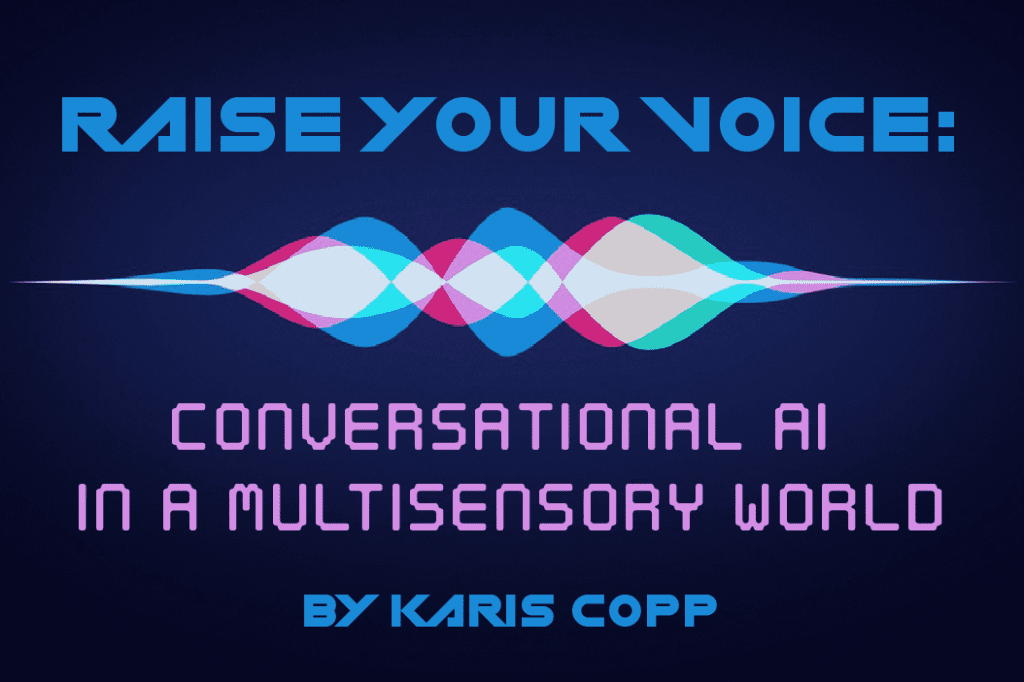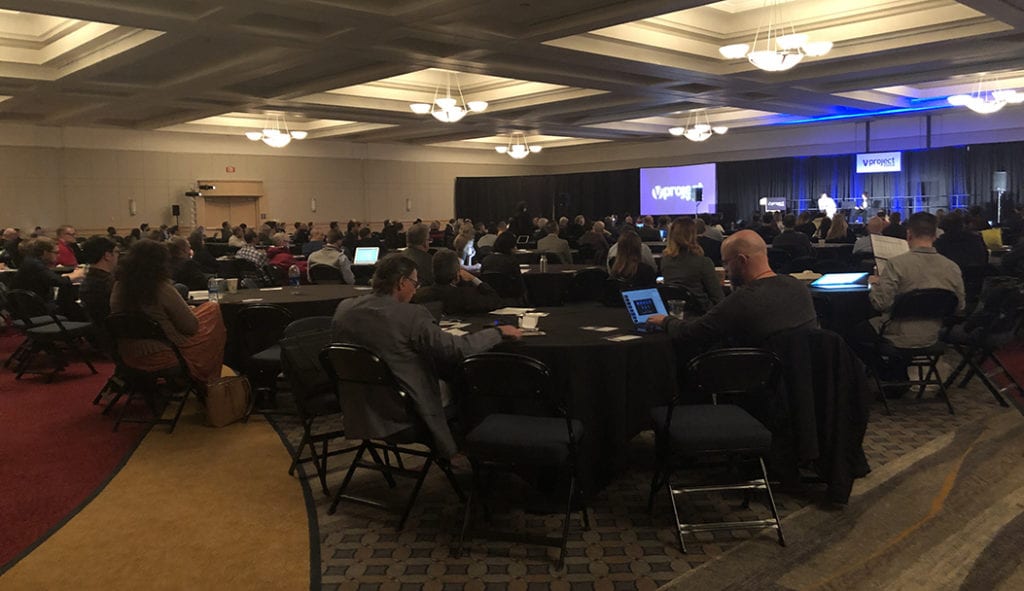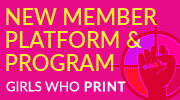Since joining the print industry as a trade journalist in 2015, I have walked many trade shows, attended many conferences, and experienced many incredible innovations. I look forward to a print event every time, and I love seeing technology both familiar and unfamiliar, faces both old and new. Earlier this year I had the pleasure of attending Project Voice with Print Media Centr. Project Voice is an event for voice technology and artificial intelligence produced by Bradley Metrock, CEO of Score Publishing and held in Chattanooga, Tennessee – this experience was something different.

You may not know that much about voice technology, but many of you are already using it every day if you have an Amazon Echo or Google Nest device in your house, but you may not be aware of the many use cases and industries that voice-based communication and conversational artificial intelligence is impacting. With most of my event experience in print, a long-established industry with an illustrious history, it was a rare opportunity to immerse myself in an industry that is just scratching the surface of its potential. The energy and enthusiasm at the conference were palpable as the likes of Amazon, Google, Samsung and Microsoft mingled with brilliant creatives implementing #VoiceFirst technology across vertical markets including healthcare, education, automotive, and marketing.
A voice for all markets
The Project Voice schedule was jam-packed, deftly organised across platform providers and markets. On day 1, the conference focused on the implementation of Alexa skills (Amazon’s name for voice apps on the platform), with a keynote from Amazon looking at innovative skills and new releases, as well as current trends in conversational AI. We looked at marketing and branding in a voice-first world, learned how healthcare providers are ensuring privacy and security in their voice endeavours, and discovered how voice technology can help publishers tell stories in amazing new ways.
On day 2 it was Google’s turn to flex its vocal muscles, kicking off with a Google Assistant keynote that took a fascinating look at some of the history of voice technology and a look at past, present, and future voice assistant challenges. We delved further into Google Assistant and marketing, talking about the importance of ‘sonic branding’, i.e. what does your business sound like? We also learned about the combination of voice and visuals in retail, and how a visual element makes us much more inclined to make voice-based purchases.

Day 3 began with a keynote from Samsung focuses on its Bixby voice assistant, which similarly to Google took a deep dive into the technology that inspired and informed the development of today’s voice assistants. Other highlights included a look at voice assistants in education, particularly the way in which they can help children with additional needs to learn at their own pace, and the healthcare applications that can help elderly and disabled people live more independently by accessing information and even controlling lighting and appliances in their home by using their voice.
Giving a voice to print
So how can the future of voice-first technology integrate with print? As the technology matures, there is sure to be a myriad of ways in which voice assistants operate harmoniously with print products to add value to customer interactions. I am probably most excited to see voice technology’s place alongside print to form truly multisensory experiences; for me, there is no substitute for the look, feel and even smell of a beautiful print product, but as a technology enthusiast and sucker for anything that makes my life more convenient, I have a particular interest in print working in harmony with other mediums.
I open an interior décor magazine, and not only does an image have an augmented reality element that allows me to view the room design in a 360-degree format, but a voice element also offers me design suggestions and further details on the items pictured. I run errands while listening to podcasts on my voice assistant-enabled headphones, and I see printed OOH media advertising a new soda flavour, so I ask my voice assistant to add it to my weekly grocery shop. A child doing their homework reads their textbook, stopping to ask their voice assistant what a word means, or for more information on a particular passage. A visually-impaired person, using a voice assistant with a screen, holds up a product’s packaging and is told which pantry item is in their hands, allowing them to prepare a meal without assistance. These are all ways in which print that is so essential to our daily lives can be enhanced by voice technology.
When it comes to brands and businesses utilising voice-first technology to boost sales and marketing, we are standing at the foot of the mountain. V-commerce, or #ConversationalCommerce, is just getting started, and monetisation, which doesn’t yet appear to be a major component of the technology, will soon materialise. As voice assistants become multimodal, become better at seamlessly weaving through every aspect of our lives, and voice design continues to innovate, voice technology will become so elemental that we won’t remember life without it.
 I can’t possibly fit everything we learned at Project Voice into one blog! Luckily you can listen to a special three-part Podcasts from the Printerverse series from Project Voice, in which Deborah Corn and I talk through our experiences after each day at the event, recalling expert insights from the behemoths of voice-first technology and sharing what we have learned as relative outsiders to the industry. Listen to part 1 below.
I can’t possibly fit everything we learned at Project Voice into one blog! Luckily you can listen to a special three-part Podcasts from the Printerverse series from Project Voice, in which Deborah Corn and I talk through our experiences after each day at the event, recalling expert insights from the behemoths of voice-first technology and sharing what we have learned as relative outsiders to the industry. Listen to part 1 below.
Listen to Bradley Metrock on Podcasts from the Printerverse:
The Rise of Voice First Technology with Bradley Metrock
Bradley Metrock on Digital Book World, Project Voice and PRINT
Listen to Bradley Metrock’s voice first podcast, This Week in Voice.
 Karis Copp is a UK-based writer, journalist, and communications expert. With a background as an editor and public relations specialist in the print industry, she now works on a freelance basis covering events, writing on industry news and trends, and working with businesses to help them tell their stories and connect with their customers. Follow her on Twitter @KarisCoppMedia.
Karis Copp is a UK-based writer, journalist, and communications expert. With a background as an editor and public relations specialist in the print industry, she now works on a freelance basis covering events, writing on industry news and trends, and working with businesses to help them tell their stories and connect with their customers. Follow her on Twitter @KarisCoppMedia.











